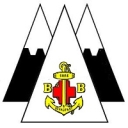Furths (England and Wales)
Technically, the 3,000 ft peaks of England, Wales and Ireland are not Munros, as the Munros are all in Scotland. The Scotish Mountaineering Club, who maintain and publish Munro's Tables, refer to the Welsh & English 3,000 ft peaks (along with those of Ireland) as Furths because they are furth (i.e. outside) of Scotland. We have arranged the Furths (in our usual south to north order) into three groups below (the Irish 3000s will hopefully follow at some point). There are eight peaks in the first group, seven in the second and six in the third.
Like the Munros, the definition of a Furth is somewhat arbitrary. They have to be over 3,000 ft, but there is no fixed prominence requirement. Prominence is the minimum height necessary to descend to get from the summit to any higher terrain. Most other mountain tables do have a prominence requirement. In the case of the Hewitts, it is 30 m. This is a bit strange as the Hewitts use imperial units for the height requirement and metric units for the prominence requirement. We have used the term Furth here, as there is otherwise no convenient term for 3,000 ft mountains in England, Wales and Ireland.
We would like to place on record our thanks to:
Prof Hywel Wyn Owen, Emeritus Professor and former Director of the Place-names Research Centre at Bangor University, Project Director of the Board of Celtic Studies: The Welsh Place-names Survey, Honorary Vice-President of the English Place-Name Society, and former President of the Society for Name Studies in Britain and Ireland, founder member of the Welsh Place-Name Society, author of The Place-names of Wales (Bangor University Press, 1998) and co-author of the Dictionary of the Place-Names of Wales (Gwasg Gomer, 2007). Prof Owen has been kind enough to check the Welsh syntax and grammar and its interpretations in the enties for the Welsh 3000s (and also the Cumbric for the English 3000s).
Prof Peter McClure, Honorary Professor of Name Studies with the Institute of Name Studies at the University of Nottingham, founder of Nomina - the journal of the Council (now the Society) for Name Studies in Britain and Ireland, former President and Vice-President of that Society and Vice-President of the English Place-Name Society, who has been kind enough to check the Old English and Old Norse syntax and grammar and its interpretations in the enties for the English 3000s.
Quizzes
Once you have bagged each of the peaks, have a go at one of our quizes:
Published on





